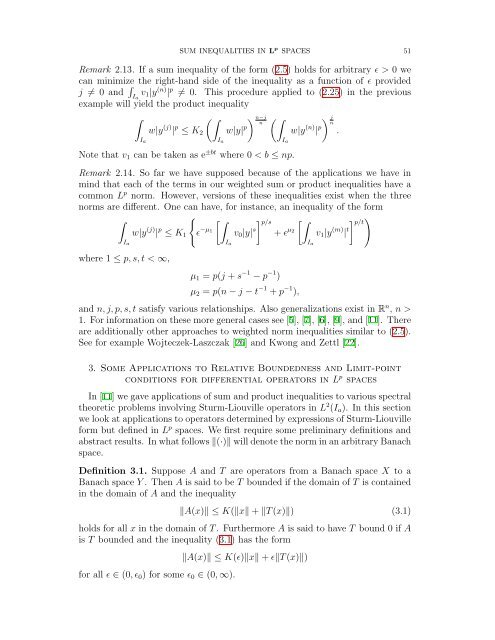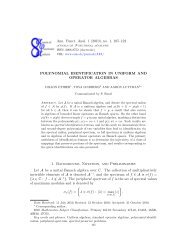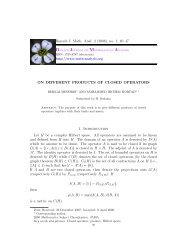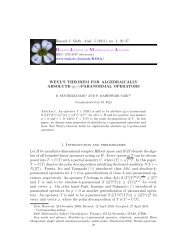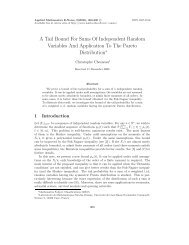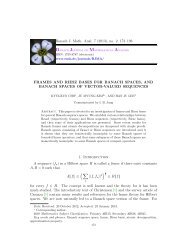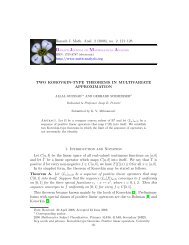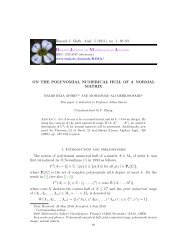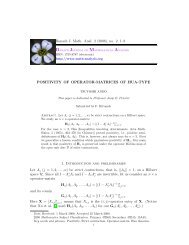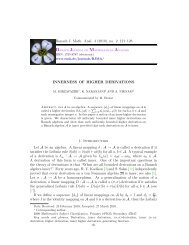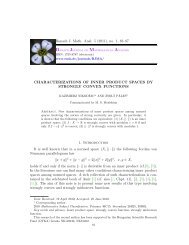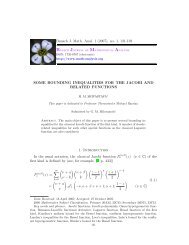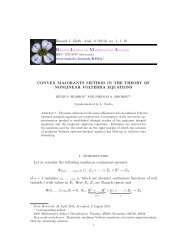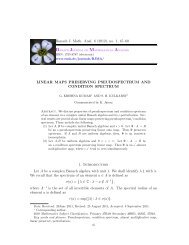Some weighted sum and product inequalities in L^ p spaces and ...
Some weighted sum and product inequalities in L^ p spaces and ...
Some weighted sum and product inequalities in L^ p spaces and ...
Create successful ePaper yourself
Turn your PDF publications into a flip-book with our unique Google optimized e-Paper software.
SUM INEQUALITIES IN L p SPACES 51Remark 2.13. If a <strong>sum</strong> <strong>in</strong>equality of the form (2.5) holds for arbitrary ɛ > 0 wecan m<strong>in</strong>imize the right-h<strong>and</strong> side of the <strong>in</strong>equality as a function of ɛ providedj ≠ 0 <strong>and</strong> ∫ I av 1 |y (n) | p ≠ 0. This procedure applied to (2.25) <strong>in</strong> the previousexample will yield the <strong>product</strong> <strong>in</strong>equality∫I aw|y (j) | p ≤ K 2(∫I aw|y| p ) n−jn(∫ I aw|y (n) | p ) jn.Note that v 1 can be taken as e ±bt where 0 < b ≤ np.Remark 2.14. So far we have supposed because of the applications we have <strong>in</strong>m<strong>in</strong>d that each of the terms <strong>in</strong> our <strong>weighted</strong> <strong>sum</strong> or <strong>product</strong> <strong><strong>in</strong>equalities</strong> have acommon L p norm. However, versions of these <strong><strong>in</strong>equalities</strong> exist when the threenorms are different. One can have, for <strong>in</strong>stance, an <strong>in</strong>equality of the form{ [∫] ) p/tw|y∫I (j) | p ≤ K 1 v 1 |ya[∫I (m) | tawhere 1 ≤ p, s, t < ∞,ɛ −µ 1I av 0 |y| s ] p/s+ ɛ µ 2µ 1 = p(j + s −1 − p −1 )µ 2 = p(n − j − t −1 + p −1 ),<strong>and</strong> n, j, p, s, t satisfy various relationships. Also generalizations exist <strong>in</strong> R n , n >1. For <strong>in</strong>formation on these more general cases see [5], [7], [6], [9], <strong>and</strong> [11]. Thereare additionally other approaches to <strong>weighted</strong> norm <strong><strong>in</strong>equalities</strong> similar to (2.5).See for example Wojteczek-Laszczak [26] <strong>and</strong> Kwong <strong>and</strong> Zettl [22].3. <strong>Some</strong> Applications to Relative Boundedness <strong>and</strong> Limit-po<strong>in</strong>tconditions for differential operators <strong>in</strong> L p <strong>spaces</strong>In [11] we gave applications of <strong>sum</strong> <strong>and</strong> <strong>product</strong> <strong><strong>in</strong>equalities</strong> to various spectraltheoretic problems <strong>in</strong>volv<strong>in</strong>g Sturm-Liouville operators <strong>in</strong> L 2 (I a ). In this sectionwe look at applications to operators determ<strong>in</strong>ed by expressions of Sturm-Liouvilleform but def<strong>in</strong>ed <strong>in</strong> L p <strong>spaces</strong>. We first require some prelim<strong>in</strong>ary def<strong>in</strong>itions <strong>and</strong>abstract results. In what follows ‖(·)‖ will denote the norm <strong>in</strong> an arbitrary Banachspace.Def<strong>in</strong>ition 3.1. Suppose A <strong>and</strong> T are operators from a Banach space X to aBanach space Y . Then A is said to be T bounded if the doma<strong>in</strong> of T is conta<strong>in</strong>ed<strong>in</strong> the doma<strong>in</strong> of A <strong>and</strong> the <strong>in</strong>equality‖A(x)‖ ≤ K(‖x‖ + ‖T (x)‖) (3.1)holds for all x <strong>in</strong> the doma<strong>in</strong> of T . Furthermore A is said to have T bound 0 if Ais T bounded <strong>and</strong> the <strong>in</strong>equality (3.1) has the formfor all ɛ ∈ (0, ɛ 0 ) for some ɛ 0 ∈ (0, ∞).‖A(x)‖ ≤ K(ɛ)‖x‖ + ɛ‖T (x)‖)


